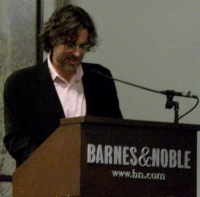Michael Chabon is on the defensive after a column in Slate criticized his portrayal of Fredric Wertham, a psychiatrist whose writings helped fuel criticism of comic books in the 1950s as overly violent and innappropriate for children.
In Chabon’s The Amazing Adventures of Kavalier & Clay, Chabon describes Wertham as “a child pyschiatrist with unimpeachable credentials and a well-earned sense of outrage” who “had for several years been trying to persuade the partents and legislators of America that the minds of American children were being deeply damaged by the reading of comic books.” Congressional hearings that followed the publication of Wertham’s book Seducation of the Innocent are credited with bringing about the end of EC Comics and the birth of the Comics Code Authority, a self-censorship body.
In a column on Slate earlier this month, Jeet Heer, co-editor of Arguing Comics, writes that while Wertham’s criticisms were off, such as of the supposed homoerotic themes in Batman and Robin comics, his principle concen about the violence, misogyny, and racism in comics of the time “wasn’t wrong.”
“Many of the comics now nostalgically celebrated by Hajdu and Chabon were extremely unsavory in their social attitudes,” Heer writes.
Heer calls Chabon’s portrayal of Wertham in Kavalier “unsympathetic” and notes Wertham’s defenders call Chabon’s view point “pure calumny.”
And to that, Chabon took issue. In a reply posted April 8, Chabon calls Heer’s description of his portrayal of Werthem “seems simpleminded, or at least awfully lazy” and says Heer must have “failed to read the novel, or at least to have read it carefully or recently.”
“In fact my personal view of Wertham, reflected in the novel itself, had progressed beyond the simplistic condemnation … or demonization that Heer suggests well before I actually wrote the relevant scenes in the novel itself,” Chabon writes. “No one who does even the most rudimentary research into Wertham’s career and accomplishments can fail to admire him for his compassion, his intelligence, his desire to help children, and his fairly snappy prose style. He was not wrong about the meretriciousness or offensiveness of many of the comics he condemned, though he was wrong about a lot of them; nor was he wrong when he argued that many of the stories featured inappropriate material for young children.”
Chabon continues: “It was Wertham’s boneheaded inferences about the direct causal connection between, say, ‘headlight’ comics and ‘deviance’ in children, not to mention the hysteria his inferences helped to foster (along with a counter-hysteria among comics fans) that have tarnished his admirable legacy.”
Chabon also took issue with Heer’s claim that Kavalier “nostalgically celebrated” the “extremely unsavory” social attitudes in the comics of those days. But Heer, in his own reply, sticks by his argument. “Surely any good reader of Kavalier & Clay would acknowledge that the novel is suffused with a nostalgic appreciation of the early comic books,” Heer says.
To read up on the entire literary dust-up, click here.
 This may shock some of my regular readers, but despite the fact that my Web site will celebrate its fifth year anniversary in six weeks, tonight was actually the first time I’ve ever actually met Michael Chabon or been to one of his readings. And so, for once, I get to give you the news first hand on what happened.
This may shock some of my regular readers, but despite the fact that my Web site will celebrate its fifth year anniversary in six weeks, tonight was actually the first time I’ve ever actually met Michael Chabon or been to one of his readings. And so, for once, I get to give you the news first hand on what happened.